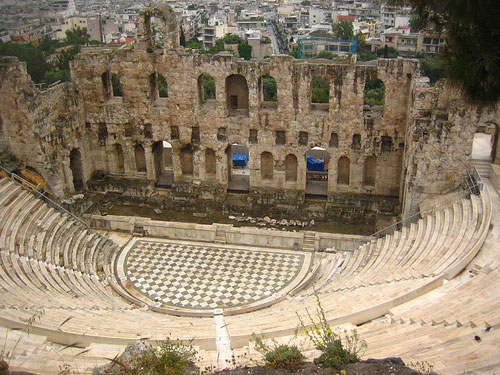Having been actively associated with the theatre and performing arts industry now for over thirty years I am able to put together some thoughts on how this beautiful art of theatre has survived over the centuries. Every time when there were rumours round the corner that theatre as an art form is slowly seeing its end, IT reinvented itself. It’s not a surprise to me anymore. As long as humans exist, this art will never see its dusk. It’s human nature to get associated with what is live. How much ever we get attracted to recorded and animated entertainment, the soul always dwells in what is real and alive. THEATRE is here to live.
Wouldn’t it be great to know the roots of this wonderful art form that has been travelling across time and has stored within itself not only the stories of mankind but has also recorded the culture and heritage of the various civilizations across boundaries.
The history of theatre charts the development of theatre over the past 2,500 years. While performative elements are present in every society, it is customary to acknowledge a distinction between theatre as an art form and entertainment and theatrical or performative elements in other activities. The history of theatre is primarily concerned with the origin and subsequent development of the theatre as an autonomous activity. Since classical Athens in the 6th century BC, vibrant traditions of theatre have flourished in cultures across the world.
Theatre probably arose as a performance of ritual activities that did not require initiation on the part of the spectator. This similarity of early theatre to ritual is negatively attested by Aristotle, who in his Poetics defined theatre in contrast to the performances of sacred mysteries: theatre did not require the spectator to fast, drink the kykeon, or march in a procession; however theatre did resemble the sacred mysteries in the sense that it brought purification and healing to the spectator by means of a vision, the theama. The physical location of such performances was accordingly namedtheatron.
According to the historians Oscar Brockett and Franklin Hildy, rituals typically include elements that entertain or give pleasure, such as costumes and masks as well as skilled performers. As societies grew more complex, these spectacular elements began to be acted out under non-ritualistic conditions. As this occurred, the first steps towards theatre as an autonomous activity were being taken.
Every single civilization across the globe has had its share of contribution to the blossoming of today’s modern theatre. Each region though deeply rooted to its culture and tradition, some common threads of performance have existed.
The first instance of theatre dates back to the 5th century BC. The exact origins of this art form though is still obscure, traces of the first such instance of performance were around the festivities celebrating Dionysos - the Greek God of wine & fertility. As contestants in the City Dionysia's competition (the most prestigious of the festivals to stage drama), playwrights were required to present a tetralogy of plays (though the individual works were not necessarily connected by story or theme), which usually consisted of three tragedies and one satyr play. The performance of tragedies at the City Dionysia may have begun as early as 534 BC... and thus Theatre was born...

